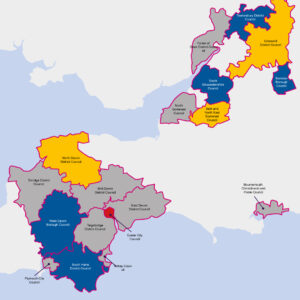Having provided communications counsel to the distribution industry for the best part of 30 years, I’ve always been amazed by the limited airplay that the logistics sector receives in the media given its business-critical nature to UK PLC and companies globally.
Whilst there have been, and still are, transport correspondents on the national media, they don’t focus in a major way on the supply chain unless there is a breaking story on one of the major players or covering it at certain times of the year when it comes into its own, for example around Christmas. The vertical media pay very little attention to logistics despite it being significantly important to their readers. That leaves the industry trade media to give the sector and its constituent businesses the profile that it deserves.
However, fast forward a year, since Covid took effect, logistics has been catapulted into the limelight. Supply chains have become a hot media topic across the board. Everyone’s talking about supply chain resilience, visibility, digitisation and collaboration. Simply put, logistics has become mainstream and deservedly so.
This newfound ‘fame’ raises the question of how the industry and its players can maintain this level of profile against the backdrop of firstly a changing media landscape, particularly with the decline of traditional media, and secondly the new highly digitised world we will be operating in as we come out of Covid.
For starters, here’s what we are seeing as significant trends in communications and which present major opportunities for logistics brands to increase their presence, credibility and distinctiveness in the marketplace going forward.
Digitise your PR efforts

SEO-optimise your content so that there is a strong connection between your PR and search engine strategy. It will make your PR so much more tangible. Use social media not just for promotion but for business-critical insights on what your competitors are doing. Build strong and influential communities on your social media channels – do your utmost to follow and connect with your customers, prospects and influential intermediaries that offer routes to market. Develop content that humanises the brand and conveys your personality as highlighted below. Join up your digital communications assets – social, webinars, website, e-bulletins – to create maximum effect.
Put the purpose into your PR
The power of purpose is playing an increasingly central role in today’s business communications. Companies are recognising more and more that customers are buying into purpose-led businesses and it’s not just about flogging services and solutions. It’s who you are as a business and what you stand for that is of equal importance to what you offer. We have seen a significant increase in interest amongst our logistics client portfolio for corporate social responsibility-led communications campaigns. This demands significant commitment and investment, so it’s not seen as paying lip service to this trend. Whether it’s supporting the Covid effort, working with schools, practicing what you preach when it comes to sustainability, CSR campaigns done well and involving staff can have a major positive impact on reputation and the bottom line.
Build the personal brands of key leaders and experts
People do business with people as much as they do with organisations. However, businesses tend to focus on building company reputations, not on their people. With digital communications increasing all the time, accelerated by the coronavirus, there has never been a better time to maximise the personal brands of the leaders and experts within your company. Have a plan for maximising presence and influence in social media as well as physical space when things get back to normal. Harness the power of thought leadership not just in the written word but in an engaging way through talking heads style videos.
Produce high value and captivating content

Sounds obvious and all PR advisers will advocate producing lots of content to boost Google rankings. But so much content produced, which has probably taken some degree of business time to create, gains very little traction on social media. Therefore, it needs to be captivating, high value, relevant and current. Adopt a journalist’s instinct for what makes content that people want to read. Strong headlines and visual components need to draw in target audiences and engender two-way dialogue.
You don’t need to publish “War & Peace” content, keep it short and ask for your audience views. There are so many talking points around logistics currently in the wake of the last 12 months that logistics providers should maximise the opportunities around thought leadership including producing expert opinion papers which can be used for data capture on the company’s website; running webinars that can be replayed across your own social media channels and for Op-Eds in mainstream media.
Utilise your assets and networks
Ensure your business is optimising all of its assets and networks to maximise the outcomes of communications and engagement activities. For example, ensuring that you are following and connecting with all your contacts (clients, suppliers, intermediary organisations, prospects) via social media. Work with strategic partners (for example target sector trade bodies, management consultancies and industry analysts) and customers to develop communications and engagement initiatives – for example a webinar on a current hot topic.
Don’t forget the mainstream media
The mainstream media still has a major role to play in the PR mix, despite the growth in use of owned media channels. They have strong reputations in their markets and are seen as a key source of information by decision makers. Whilst print media is in decline, this segment still has an extremely strong readership online. Ensure that any mainstream media programme considers tactics that present opportunities to communicate your business and engage with key stakeholders across the broad spectrum of traditional media channels including national print and broadcast, vertical, logistics trade and regional media.
The media landscape and the world we operate in are changing considerably at the same time – however embrace fully the new and exciting opportunities it brings for the logistics sector to deliver more effective communications in the future in support of your business goals and ambitions.
Chris Lawrance is Managing Director and Head of PR at national strategic communications consultancy JBP. He has advised a number of market leading logistics businesses on their communications strategies, working with the likes of CHEP, C.H.Robinson, Culina Logistics, London City Bond, NFT, Palletways and Wincanton. JBP is currently conducting the first ever logistics-led communications study, What’s the future of logistics communications? The Logistics Communications Trends 2021. Please take complete survey here and email chris.lawrance@jbp.co.uk if you would like to provide your perspectives

Managing Director


